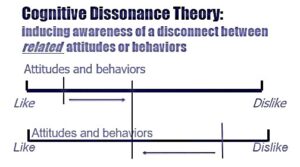At the Oval Office meeting the President took the opposite position of the one urged by Marco Rubio. Rubio suddenly fell silent. As the Guardian reported, “The image of a sullen Rubio quickly went viral online, with one social media user dubbing him ‘the corpse on the couch.’”
These are challenging times. But for a student of persuasion, the events unfolding within the national government provide a flurry of opportunities to evaluate a core theory of persuasion. Events have conspired to force people to acknowledge the contradictory actions of their leader which, in theory, should force them to resolve the discrepancy. A researcher just needs to notice a person’s apparent discomfort with a world that is suddenly different from what they planned. What will change?
Theory of Cognitive Dissonance
Cognitive dissonance theory hypothesizes that individuals will feel some mental stress if new information presents an apparent inconsistency between two firmly held beliefs, or a belief and a behavior. The theory assumes that the inconsistency will trigger an impulse to reduce or explain away the discrepancy. Although this old and grand theory offers something less than a certain “if-then” result, it is also premised on the familiar psychological motive to resolve apparent contradictions. For example, suppose that you found out that a close friend has been charged with theft of pages from artbooks taken from a local library. If the information disturbs you, would you change your attitude about your friend? A hypothesized result is a new realignment that resolves into more consonant attitudes: perhaps less regard for the friend and a thought that the crime was a small one. The theory’s original author, Leon Festinger, proposed that cognitive dissonance is the tension that results when two thoughts seem incompatible.
 There are many possible refinements and variations on this model, but even in its simplest form it offers a theory of how our attitudes can change. Festinger was also wise enough to never underestimate our willingness to deny a contradiction.
There are many possible refinements and variations on this model, but even in its simplest form it offers a theory of how our attitudes can change. Festinger was also wise enough to never underestimate our willingness to deny a contradiction.
Consider another example. Imagine that you discovered a distant ancestor in your family-owned slaves before the civil war. How would you feel? Writer Cynthia Carr remembers her shame when she learned that fact about an ancestor. She sought to resolve the resulting dissonance by telling an African American friend. For her, that comment reduced some of the dissonance. On the surface, at least, we want our mental life fit together in a more or less coherent whole.
And so we arrive at this moment in the nation’s fraught politics, considered in a few examples from the human dissonance machines in the White House. It appears that the admired business innovator Elon Musk may have a bit of a fascist streak, as demonstrated in his recent efforts to urge German voters to support a far-right party that has been more accepting of the nation’s Fascist past. Musk’s words were mostly an unwelcome intrusion into German and American politics, made even more so with Hitler-style arm salutes offered at Trump’s inauguration. What gives? The dynamic is the same if a person thought that reducing the costs of everyday goods would be Donald Trump’s top priority, as per the campaign. But his first big push has been to place tariffs on foreign goods coming into the country, which will likely raise prices for Americans. An unwelcome surprise? Similarly, if a person like Rubio thought Vladimir Putin is the true villain/aggressor of the Ukraine war, will they accept the President’s absurd judgment that Ukraine’s Vladimir Zelensky is to blame? In the traditional American view, Putin is the anti-Christ and Zelensky is the patriot.
These and other reversals should produce a flood of dissonance for Trump supporters. Should they feel dissonance and buyer’s remorse over owning what demonstrators against Elon Musk are calling Tesla “Swasticars?” Or changing topics, does a daughter’s recent dismissal from her dream job at NOAA increase his dislike of Musk and Trump, who initiated all the massive federal job cuts?
Some politicians can pivot on dime if they are asked to square a circle. Doublespeak is just second-nature. Ask them their favorite color and it is plaid. Marco Rubio entered the last Oval Office meeting as an avid foe of Vladimir Putin and a supporter of Ukraine. By the end of that meeting he sat in silence as the President more or less took the opposite position. And so the image of a sullen Rubio. The fact that a committed belief can be so easily discarded is one reason Congress as a whole is held in such low esteem.
Alternate Paths
As noted, Festinger was savvy and knew that humans could walk a crooked path out of an obvious contradiction. But one final example surprised me. A recent Associated Press report followed a young new hire in the Forest Service who had barely begun her work before she was fired: a result that devastating to her. As she was modeling her new uniform some of her relatives unhelpfully noted that the reduction was probably necessary. They thought she had too many co-workers. The worker was rightfully unprepared for the personal she experienced for privileging the faux urgency of job reductions over dismissal of her own achievement. Dissonance Theory is useful, but when a predicted outcome fails to materialize, it can also point to other factors, like how cruel American life has become.
________________________
Portions of this essay are adapted from the Author's Persuasion and Influence in American Life, Eighth Edition.
![]()


 And for keeping the same geographical label, the Associated Press was suddenly barred from full access to the White House.
And for keeping the same geographical label, the Associated Press was suddenly barred from full access to the White House.